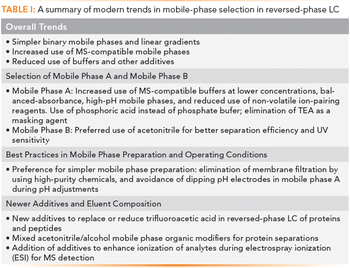
LCGC North America
Click the title above to open the LCGC North America October 2018 issue in an interactive PDF format.

LCGC North America
Click the title above to open the LCGC North America October 2018 issue in an interactive PDF format.

LCGC North America
Topics that stood out at HPLC 2018 include advances in large-molecule separations, multidimensional separations, 3D printing, chiral separations, and HILIC. Also, many speakers addressed separation fundamentals, including ways to increase speed, generate higher throughput, and add selectivity.

LCGC North America
Many LC users are unclear what happens when we combine two (or more) flow streams in LC systems, and when mixers are needed to blend the fluids. This discussion explains why mixers are needed, and when and how you might consider using something other than the default mixer setting.

LCGC North America
Modern trends in LC mobile-phase selection and preparation include using simpler mobile phases, increased use of MS-compatible mobile phases, and eliminating filtration and certain mobile-phase additives. Here, we discuss those and other trends and best practices, as well as the fundamentals behind them.

LCGC North America
Molecularly imprinted polymers can replace conventional sorbent materials in sample preparation techniques such as solid-phase extraction (SPE), solid-phase microextraction (SMPE), and matrix solid-phase dispersion (MSPD), offering increased selectivity over the target analytes.

LCGC North America
Elena Ibañez is determined to make sample preparation for food analysis not only more environmentally friendly but also more efficient, as she explores approaches that simplify solvent selection, increase solvent selectivity, and lessen the role of chemical solvents.

LCGC North America
Proper tuning and calibration of instruments ensure their peak response and an exact mass-to-charge ratio and ion abundance measurement.